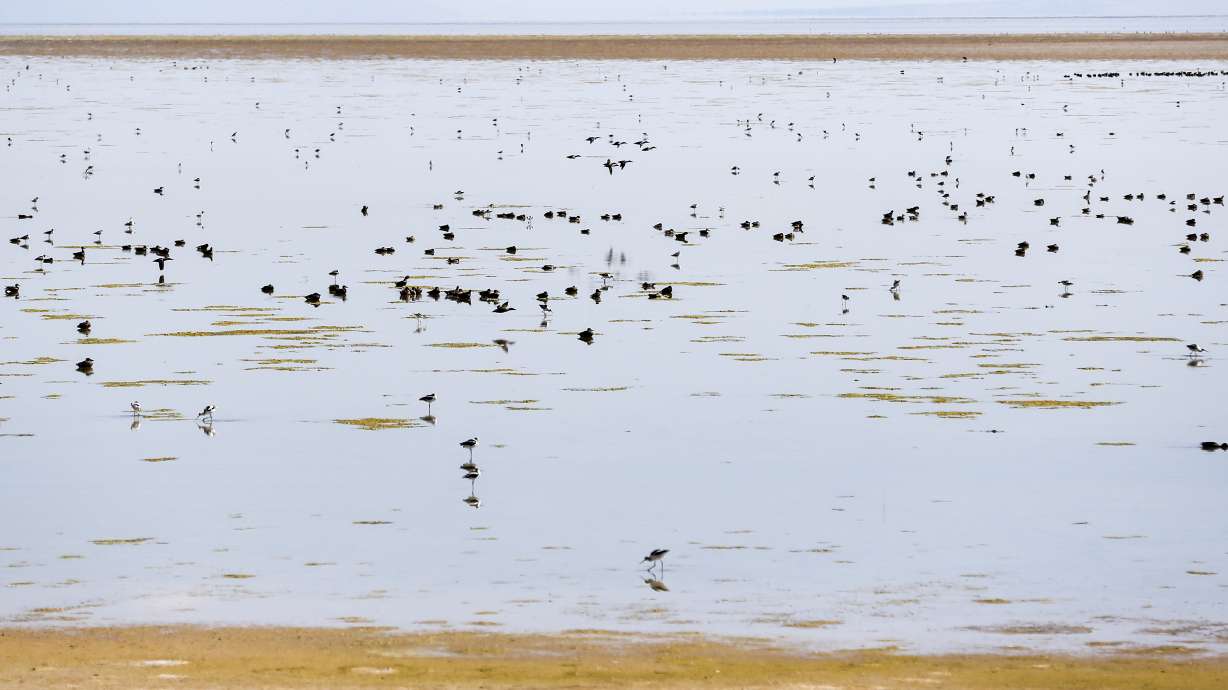Estimated read time: 4-5 minutes
This archived news story is available only for your personal, non-commercial use. Information in the story may be outdated or superseded by additional information. Reading or replaying the story in its archived form does not constitute a republication of the story.
SALT LAKE CITY — Sen. Mitt Romney is reaching across the aisle to try and create a regional scientific program aimed to better understand what drying saline lakes — such as the Great Salt Lake — mean for western ecology and wildlife.
Romney and Jeff Merkley, D-Oregon, jointly reintroduced the Saline Lake Ecosystems in the Great Basin States Program Act last week. It comes as ongoing drought conditions continue to slam Utah and the West, leading to critical questions about saline lakes and adjoining wetlands within the Great Basin.
If passed, the bipartisan bill would instruct the U.S. Geological Survey to "assess, monitor and benefit the hydrology of saline lakes in the Great Basin and the migratory birds and other wildlife dependent on those habitats." The bill would authorize $5 million for every federal fiscal year between 2022 and 2027 to carry out the project.
The senators said this would help fill a "critical data gap" regarding saline lake ecosystems that's been difficult to address due to declining water levels. That includes the Great Salt Lake, which is the largest saline line in the Western Hemisphere but has experienced an 11-foot drop in water elevation over the course of 150 years, according to a 2019 report compiled for the Great Salt Lake Advisory Council.
In a statement Thursday, as the senators reintroduced the bill, Romney said the Great Salt Lake is an "iconic and cherished part of Utah" in addition to its importance to wildlife.
"I'm proud to lead this legislation with Sen. Merkley, which will establish a scientific foundation and ongoing monitoring system to inform coordinated management and conservation actions for threatened Great Basin saline lake ecosystems and the communities who depend on them," his statement continued. "This legislation should complement and help elevate the work already being done by the state of Utah to understand this key resource and the role it plays as part of the larger landscape."
According to a 2017 study published in Nature Geoscience, which was led by Utah researchers, large saline lakes represent about 44% of the volume and 23% of the area of all the lakes in the world — led primarily by the Caspian Sea.
The study found that these lakes were also shrinking on a global scale. It pinpointed human use as a major cause, especially agricultural irrigation dating back to 645 Common Era.
Researchers argued that a major reason for the rise in consumption is that agricultural, industrial and municipal applications for water that would otherwise land in saline lands "increase economic productivity and stability" while the "ecological, sociological and economic benefits of saline lakes are diverse, but not as easily monetized."
The issue is again receiving attention with the ongoing drought situation not just in Utah, but across the West. The U.S. Drought Monitor lists about 84% of the entire region — 11 states in total — as in at least a moderate drought.
Close to two-thirds of the land area is in at least a severe drought, while one-fifth of the West — including more than half of Utah — is in an "exceptional" drought.
Other saline lakes in the West include Lake Abert and Goose Lake in Oregon, which is why Merkley also pushed to reintroduce the bill.
"These ecosystems must be protected, but we can't do that without sufficient data," he said. "So let's work to secure the studies and science we need to put long-term plans into action, so we can ensure that our saline lakes ecosystem can thrive for generations to come."
Sens. Catherine Cortez Masto, D-Nevada; Jacky Rosen, D-Nevada; and Ron Wyden, D-Oregon, have also pledged support to the bill. Other supporters of the bill include Gov. Spencer Cox and the Audubon Society.
Cox said the piece of legislation is a "superb bill" for the future of the Great Salt Lake, as well as the animals and people that rely on it.
"It would address the economic value associated with the lake and the importance of migratory birds, help fill gaps in science around hydrology, integrate existing work being done on water quality, and assess future water needs," Cox said in a statement. "This legislation could be a key to ensuring the viability of the Great Salt Lake far into the future."
Marcelle Shoop, the director of Saline Lakes Program for the Audubon Society, added that she believes the bill was reintroduced at "such an important time," citing lakes in the region drying up "at an alarming rate."
"The regional program will build on existing knowledge to help us understand how water supplies and habitats are changing, and identify opportunities where we all can work together on solutions that protect bird habitat and communities," she added. "We're grateful for the leadership of Sen. Merkley and Sen. Romney in championing this important legislation."









